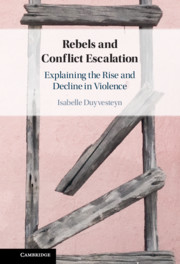Book contents
- Rebels and Conflict Escalation
- Rebels and Conflict Escalation
- Copyright page
- Dedication
- Contents
- Tables
- Vignettes
- Preface and Acknowledgements
- Abbreviations
- 1 Rebels and Escalation
- 2 Escalation and De-Escalation
- 3 Political Opportunity and Rebel Violence
- 4 Political Will
- 5 Capabilities
- 6 Capabilities
- 7 Political Will
- 8 Legitimacy and Support
- 9 De-Escalation
- 10 The Escalation and De-Escalation of Rebel Violence
- References
- Index
3 - Political Opportunity and Rebel Violence
Published online by Cambridge University Press: 01 July 2021
- Rebels and Conflict Escalation
- Rebels and Conflict Escalation
- Copyright page
- Dedication
- Contents
- Tables
- Vignettes
- Preface and Acknowledgements
- Abbreviations
- 1 Rebels and Escalation
- 2 Escalation and De-Escalation
- 3 Political Opportunity and Rebel Violence
- 4 Political Will
- 5 Capabilities
- 6 Capabilities
- 7 Political Will
- 8 Legitimacy and Support
- 9 De-Escalation
- 10 The Escalation and De-Escalation of Rebel Violence
- References
- Index
Summary
Chapter three focuses on the background and production of political violence based on the idea of the political opportunity structure in rational legalistic and patrimonial political orders. It demonstrates that in many cases mobilisation occurs after the outbreak of violence rather than preceding it. The two vignettes that are used to explain these processes are the rise of the Montoneros in Argentina in the 1970s and the Rebel United Front in Sierra Leone in the 1990s. The causal mechanism that surfaces in this chapter relates to the raising of the saliency of the perceived issues at stake, which constitutes a major form of escalation in armed conflict.
- Type
- Chapter
- Information
- Rebels and Conflict EscalationExplaining the Rise and Decline in Violence, pp. 47 - 66Publisher: Cambridge University PressPrint publication year: 2021

